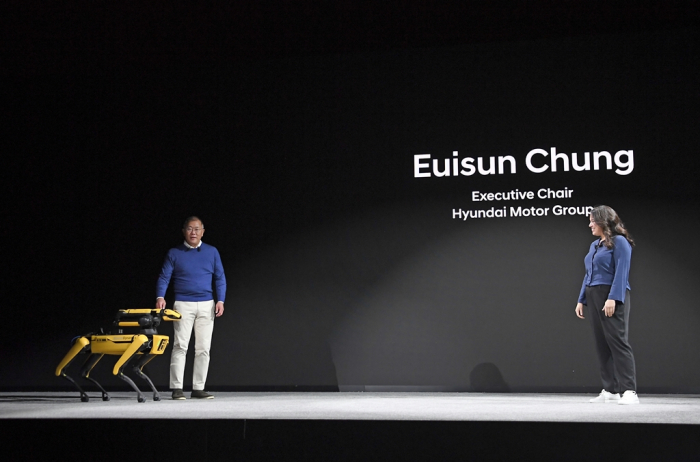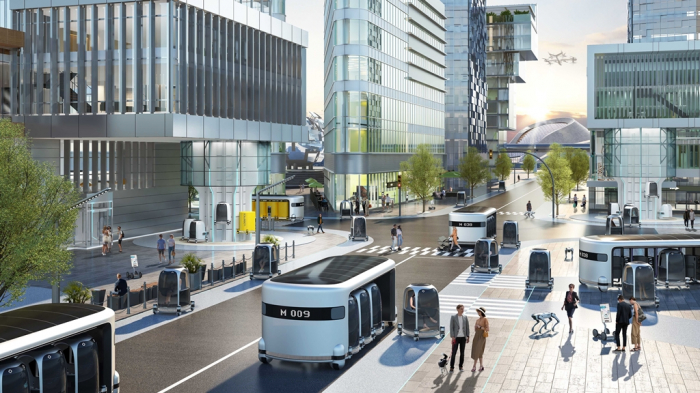Future mobility
Hyundai looks beyond cars to link real, virtual worlds in metamobility
Instead of cars, robotics takes center stage at the automaker’s CES 2022 presentation
By Jan 05, 2022 (Gmt+09:00)
3
Min read
Most Read
LG Chem to sell water filter business to Glenwood PE for $692 million


KT&G eyes overseas M&A after rejecting activist fund's offer


Mirae Asset to be named Korea Post’s core real estate fund operator


StockX in merger talks with Naver’s online reseller Kream


Meritz backs half of ex-manager’s $210 mn hedge fund


LAS VEGAS – Hyundai Motor Co. has unveiled its grand ambitions to pioneer the use of robotics in both the real world and the virtual sphere, called metaverse, to provide a broader range of advanced mobility services.
With the metaverse set to become a daily space for people in the near future, the top South Korean automaker said it expects the emergence of a new type of virtual platform, where distinctions from reality is blurred.
What used to be a virtual experience due to technological limitations can be reflected in the real world through the connection of smart devices – a concept Hyundai termed metamobility, which utilizes hardware as a real-world proxy for virtual reality interactions.
“At Hyundai, we are harnessing the power of robotics to achieve great things. We envision future mobility solutions made possible by advanced robotics, expanding our mobility solutions to metamobility,” Chairman Chung Euisun said at a media briefing on Tuesday at the Consumer Electronics Show (CES) 2022.
He offered several examples of how the fusion of Hyundai’s robotics technology with the metaverse can drive the paradigm shift toward future mobility, going beyond the traditional means of transportation.

Metaverse users, he said, will be able to bring changes to the real world through robotics and digital twin technology, a virtual representation of a physical object.
For example, when a user accesses a digital twin of their home in the metaverse while away from their physical home, they will be able to feed and hug a pet through the use of an avatar robot.
According to Hyundai, a vehicle can be transformed into a workspace or an entertainment room that includes a 3D video game platform. At a smart factory, humans outside the plant can remotely control robots that interact with machines and products inside the plant.
“The idea behind metamobility is that space, time and distance will all become irrelevant. By connecting robots to the metaverse, we will be able to move freely between both the real world and virtual reality,” said Song Chang, head of Hyundai’s transportation-as-a-service (TaaS) division.

MOBILITY OF THINGS
To make all this work, Hyundai said it is building a Mobility of Things (MoT) ecosystem that will link modular robotic platforms to perform different mobility services.
One such module Hyundai will showcase at CES 2022 is the Plug & Drive (PnD) module, a single-wheel robotics platform that combines intelligent steering, braking and suspension with in-wheel electric drive, cameras and lidar sensors for automated operation.
Hyundai will also exhibit the MobED (Mobile Eccentric Droid) small mobility platform that uses the Drive & Lift (DnL) module, which combines several PnD modules in one structure.

“In the world to come, we will not move our things, but things will actually move around us with the PnD module making traditionally inanimate objects mobile,” said Hyun Dong-jin, head of Hyundai’s Robotics Lab.
The metamobility vision comes as Hyundai Motor aims to morph into a smart mobility solutions provider, focusing on autonomous driving technologies, electric vehicles, urban air mobility and hydrogen fuel cell systems.
The automaker is displaying no cars at its CES 2022 booth, which instead is full of future mobility devices and robots, including Spot, the quadruped robot dog made by US tech firm Boston Dynamics, which Hyundai acquired last year.
Write to Byung-Uk Do at dodo@hankyung.com
In-Soo Nam edited this article.
More to Read
-
 CES 2022Convergence, metaverse, green: Korea Inc.’s themes at CES 2022
CES 2022Convergence, metaverse, green: Korea Inc.’s themes at CES 2022Jan 04, 2022 (Gmt+09:00)
4 Min read -
 Future mobilityHyundai’s Chung charts vision as top-tier eco-friendly auto brand
Future mobilityHyundai’s Chung charts vision as top-tier eco-friendly auto brandJan 03, 2022 (Gmt+09:00)
3 Min read -
 Hydrogen economyHyundai Motor’s Chung Euisun: Vision 2040 for hydrogen society
Hydrogen economyHyundai Motor’s Chung Euisun: Vision 2040 for hydrogen societySep 07, 2021 (Gmt+09:00)
3 Min read -
 New Hyundai Motor Chairman Chung Euisun sets sights on future mobility
New Hyundai Motor Chairman Chung Euisun sets sights on future mobilityOct 14, 2020 (Gmt+09:00)
4 Min read
Comment 0
LOG IN


